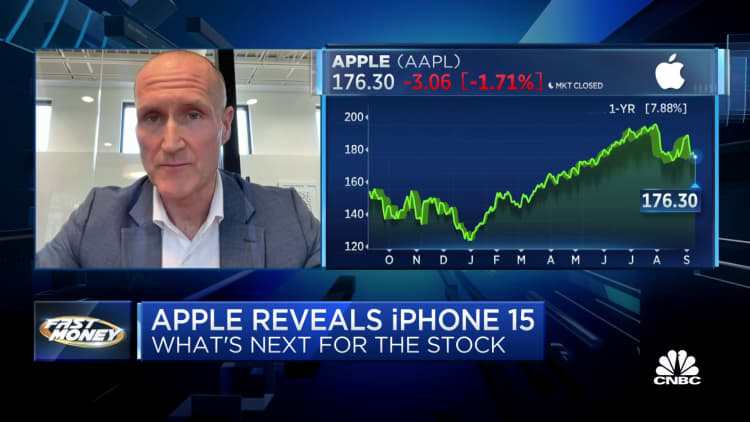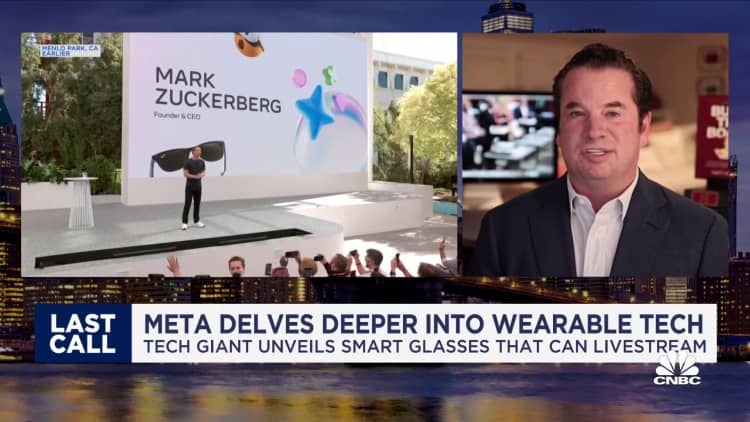At Meta's annual Connect conference this week focused on virtual reality and the metaverse, one word was on everyone's lips: Apple.
Meta CEO Mark Zuckerberg was enthusiastic in debuting his company's Quest 3 VR headset, which starts at $499 and will begin shipping in October. His company touted the growth of its VR app store — Quest Store — which has generated $2 billion in sales since its debut in 2019, up from the $1.5 billion the company announced last year during the conference.
The big difference this year from the event in 2022 is that attendees have a much clearer picture of Apple's upcoming entry into the VR market.
The iPhone maker in June announced its Vision Pro mixed-reality headset at an eyepopping price of $3,499 when it goes on sale next year. While it's Apple's first major foray into VR, the company's longtime dominance in premium consumer devices and its winning reputation in hardware has created a buzz that was missing from Meta's prior industry events.
VR and mixed reality are expected to remain niche markets for years to come, but conversations with nearly a dozen attendees who gathered at Meta's Menlo Park, California, headquarters this week show the tone is changing for developers and VR companies regarding the potential for an expanding industry.
"There's curiosity for sure with Apple entering the market," said Tom Symonds, CEO of the UK-based VR firm Immerse. "Apple has always been able to marry the hardware and the software in a seamless way."
Prior to Apple's Vision Pro announcement, the VR industry was going through a bit of an identity crisis, with venture capitalists pulling back their investments alongside the drop-off in Web3 and related crypto projects. Meanwhile, Meta has been losing billions of dollars a quarter building its vision of a metaverse, and Zuckerberg has shown no interest in slowing down, frustrating many Wall Street investors who see only mounting costs.
Even though Apple's product won't go on sale for months and it's unclear how many people will want it or be able to buy it, the company's entry has given a sense of legitimacy to some of Meta's efforts.
In addition to showing off its latest headset this week, Meta debuted the newest version of its Ray-Ban smart glasses, developed with EssilorLuxottica. The new glasses, which will cost $299 when they're available to purchase on Oct. 17, use Meta's artificial intelligence software via a smartphone so people can identify landmarks or translate signs when looking at various objects.
'Pushing the bar'
It would have been a "big loss of confidence" if Meta stopped investing heavily to push the VR market forward, said Aneesh Kulkarni, chief technology officer of the VR training firm Strivr.
"Meta is pushing the bar, and who has the money to push the bar?" Kulkarni said.
He added that while $2 billion of app store sales "may not sound like a lot compared to the Apple store," it's a big and important number. Apple has a giant marketplace — $1.1 trillion in developer billings and sales in 2022 — because of the popularity of iPhone and iPad apps.
Josette Seitz, a mixed-reality developer for the social impact company Baltu Technologies, said Apple could have an advantage courting businesses that already use its products, like those that employ iPads to help conduct maintenance and other related services. A company that currently supplies field workers with iPads for inspections or similar tasks could conceivably make the easy transition to the more immersive Vision Pro because of the devices' interoperability, she said.
At its high price point, the Vision Pro will likely be more of a product for businesses, Seitz said. Regardless, it's important to have more entrants in the market.
"There shouldn't just be one company," she said. "We can't have this be a monopoly system."
Gaspar Ferreiro, a developer with the VR firm Coal Car Studios, called the Vision Pro's price "insane" and said Apple is taking a "big gamble."
"Enterprises will absolutely take the gamble," Ferreiro said, noting some businesses will splurge on Apple devices because of the company's reputation and prestige.
Meta still faces its own challenges. The company has struggled to bring VR into the mainstream despite a yearslong head start, and Ferreiro isn't sure that the Quest 3's improvements over the Quest 2, which is $200 cheaper, will be enough to win new customers who aren't industry insiders or developers.
"The general consumer is probably going to be faced with a conundrum, do I spend another $200 on this other device?" Ferreiro said.
One of the Quest 3's biggest improvements over the previous version is its so-called "passthrough" feature, which converts a person's field of vision into a digital format, thus allowing computer visuals to be overlaid on to the physical world. Looking at physical surroundings using the Quest 2 proved to be a blurry experience that lacked color, but with the Quest 3 it's much clearer and should be more enjoyable to use.
For developers, Ferreiro said, that translates into the ability to create more compelling content and visually attractive experiences that integrate the physical and digital worlds.

Jeffrey Morin, CEO of the Litesport VR fitness service, said the Quest 3 is priced "just outside of my comfort zone for, like, me buying my kid a Christmas gift."
But he agrees that improved passthrough is very valuable and was crucial for the company's upcoming mixed-reality app it created for Xponential Fitness that will let users work out with real personal trainers who can be virtually beamed into their living rooms.
As far as working with Apple, Morin said Litesport will look for ways to develop for the Vision Pro as it evolves and the price potentially drops to between $1,000 to $1,500 in the future. Initially, the price is too high and the Vision Pro will require users to wear a battery pack, creating an added nuisance during a workout.
The advantage Apple offers is a base of customers who "are going to be way more likely to pay for a subscription," providing a recurring source of revenue, he said. Based on Morin's experience thus far, most current Quest users are gamers who are more accustomed to making one-time app purchases.
Morin said that even though Apple's product isn't out yet, he noticed an increase in the number of people using Litesports' VR fitness apps once it was announced, underscoring the VR community's overall excitement.
"They fired up their headsets and they're, like, let me see what's out there again," Morin said.
Ultimately, Apple's move into VR is proof that it's not just an ambitious Facebook side project.
"It's not like Mark's little toy anymore," Morin said. "Now it's everyone's."
WATCH: The smart glasses unveiling was a 'big yawn' and Meta knows it


